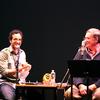Marcelo Gleiser appears in the following:
Portrait Of A Physicist As A Young Man
Wednesday, May 08, 2013
When I was starting my PhD studies at King's College London, I had the opportunity to meet the famous physicist John Bell. His work established that quantum mechanics — and the bizarre kind of reality it entails — happens to be the way the world is. My conversation with ...
Who's Afraid Of The Quantum Ghost?
Wednesday, May 01, 2013
When Isaac Newton published his theory of universal gravitation in 1686, he knew he'd have to confront a few critics. Like a ghost stretching its arms across empty space, Newton's theory described the gravitational attraction between two masses, say, the Sun and the Earth, as a mysterious force that acted ...
Defining Our Place In The Universe
Wednesday, April 17, 2013
A widespread critique of science is that it tells us that the more we know, the more insignificant we are. It's the famous after-Copernicus blues: everything went downhill ever since Earth was moved from the center of the cosmos. Since then, the Sun was pushed out from the center too, ...
Our Dark Materials
Wednesday, April 10, 2013
The history of science is filled with obscure and bizarre substances. Despite all that we have learned in the past 400 years, the trend continues. Perhaps it's unavoidable, being the way we figure things out. We need to find some apparently weird stuff — playing a game of cat and ...
Mind And Matter: Confessions Of A Perplexed Soul
Wednesday, April 03, 2013
After a week on the origin of life and another on the origin of the universe, we now turn to the third installment of this series, a digression on the origin(s) of mind. The plural expresses the many ways in which we can think of mind and its origin. I ...
The Origin Of The Universe: From Nothing Everything?
Wednesday, March 27, 2013
Last week, I started a discussion of what I call "The Three Origins," focusing first on the origin of life. Although we are far from knowing how non-living matter became living organisms on primitive Earth some 3.5 billion years ago (or more), or how to repeat the feat in ...
Planck Data: Universe Older And Slower
Thursday, March 21, 2013
Scientists from the European Space Agency announced results Thursday from 15.5 months of operation of their Planck satellite mission. Results were eagerly awaited by the astronomical community, as they achieved higher precision than the earlier American mission WMAP. Both satellites measured the tiny temperature fluctuations on ...
Where Did Life Come From? The Mind? The Universe? Can We Even Know?
Wednesday, March 20, 2013
Today I'd like to start a discussion on the ways certain kinds of questions present formidable challenges to the conventional scientific method of explanation, based on hypotheses and empirical validation. Given that the topic is vast and space short, I will divide the discussion into three parts (at least). Although ...
Is Mathematics A Criterion For Truth In The Natural World?
Wednesday, March 13, 2013
Some results in mathematics have the force of real truths, being independent of interpretation or context. When we state that 2 + 2 = 4 we know that this will be correct for any intelligent entity able to count. In algebra, given an equation, say, x + 3 = 4, ...
Is The Earth Alive? That Depends On Your Definition Of Life
Wednesday, March 06, 2013
As some of you may know, I spent last week at CERN, the European high-energy physics laboratory where the famous Higgs boson was discovered last July. Every time I go to CERN I feel a deep sense of reverence. Apart from quick visits over the years, I was there ...
Dispatch From CERN: Which Higgs?
Wednesday, February 27, 2013
This week I'm at CERN (with co-blogger Stuart Kauffman), the high-energy physics laboratory where, last July, the Higgs particle was found. Yesterday, we heard from Sergio Bertolucci, CERN's director of research and scientific computing.
There is no question that a new particle was found, as reported last July. There ...
What Happened Before The Big Bang? And Other Weird Cosmic Questions
Wednesday, January 11, 2012
Dexter's Killer Commentary On Science And Religion
Friday, October 28, 2011
Desperately Seeking Symmetry
Monday, April 18, 2011
Nothing's the Antimatter
Monday, April 18, 2011
Just after the Big Bang, the universe was a primordial soup made of light. Then, it started belching out matter. Neil deGrasse Tyson explains how deeply shocking this is, and Marcelo Gleiser reveals an imperfection in the laws of physics that makes our very existence possible.
Mirror, Mirror
Monday, April 18, 2011
The mathematician Charles Lutwidge Dodgson posed a big question about mirrors in one of his best-known books: Through the Looking-Glass (yup, Dodgson's pen name was Lewis Carroll). Natasha Gostwick of Storynory reads an excerpt that gets at the heart of the trouble: is mirror milk any good to drink? ...















